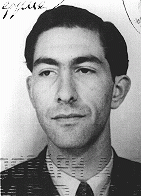
Ernest G. Heppner
Born: August 4, 1921
Breslau, Germany
Ernest was one of three children born to a Jewish family in the commercial city of Breslau, which had one of the largest Jewish communities in Germany. His father, a World War I veteran, owned a factory that made matzah, the unleavened bread used during the Jewish holiday of Passover. Ernest was 12 when Hitler took power in 1933.
1933-39: Ernest often got in trouble at school because people called him names. "Christ-killer" and "your father kills Christian babies for Passover" were common taunts. Many thought the Nazis were a passing political fad but by 1935 their laws were menacing. Signs appeared declaring, "Jews are forbidden." In 1938, after his synagogue was burned (during Kristallnacht), his family realized they had to flee Germany. Since his family could only get two tickets, Ernest and his mother boarded a ship for Asia, leaving their family behind.
1940-44: Ernest ended up in Japanese-controlled Shanghai, the only place refugees could land without a visa. There, as a volunteer driving a truck for the British army's Shanghai Volunteer Force, he got meals and was better off than many other refugees. After Pearl Harbor, in December 1941, conditions among the city's refugees worsened--American relief funds, the refugees' lifeline, could not reach Shanghai. In 1943, under pressure from Germany, the Japanese set up a ghetto.
Ernest spent two years in the Shanghai ghetto before the city was liberated in 1945. After the war, he worked for the U.S. Air Force in Nanking, China, for several years, and later immigrated to the United States.

